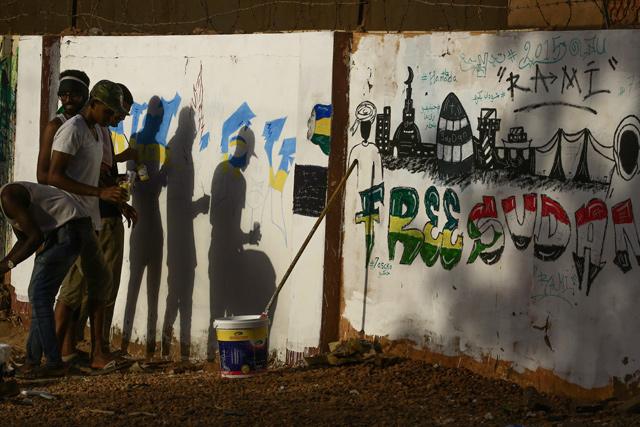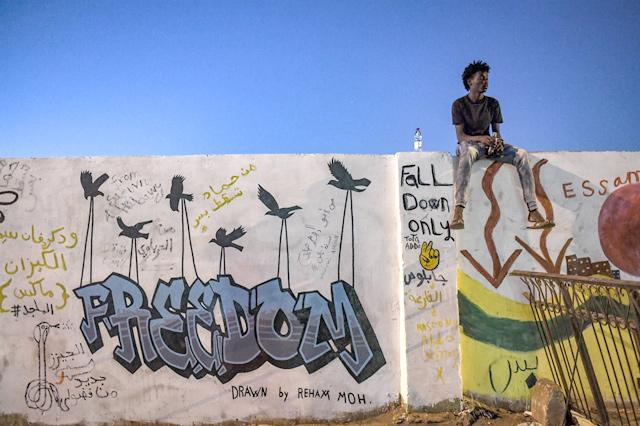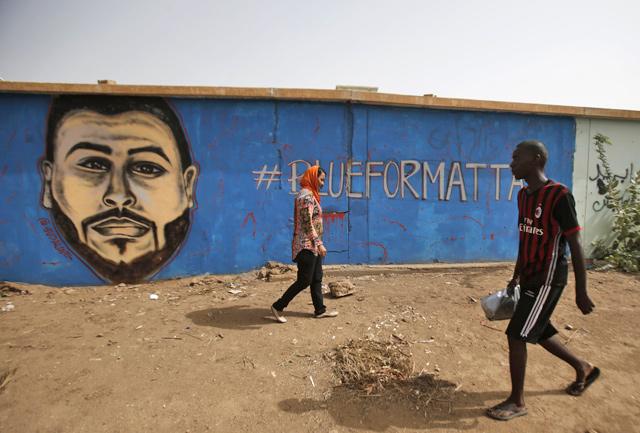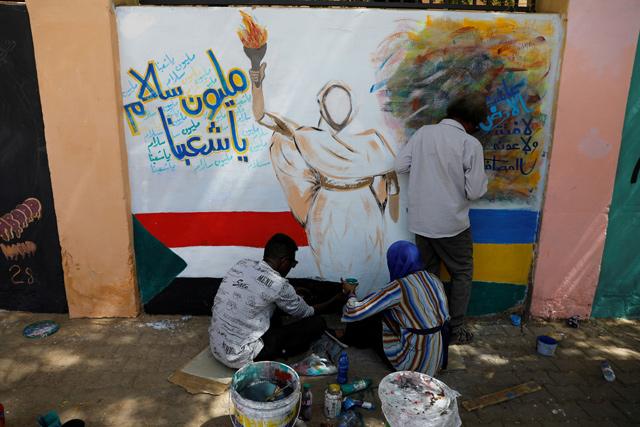You are here
Bashir’s overthrow inspires Sudan graffiti artists
By AFP - Apr 25,2019 - Last updated at Apr 25,2019

Sudanese protesters paint a graffiti during a ‘million-strong’ march outside army headquarters, in the capital Khartoum, on Thursday (AFP photo)
KHARTOUM — With the fall of veteran leader Omar Al Bashir, Sudan’s long-stifled graffiti artists are finally able to express their art, painting the country’s revolution in murals and portraits flourishing across Khartoum’s walls.
Inspired by the months-long protest movement that finally toppled Bashir on April 11, several artists are using the walls near the army headquarters as a canvas.
The once-grey walls close to the complex, where thousands of protesters remain encamped, are full of large clenched fists and victory signs symbolic of the popular uprising that ended Bashir’s rule.
Bright murals of Sudanese flags and portraits of protest leaders have also come up near the complex.
“It was unimaginable to paint any wall without a permit, let alone around the army building, but this revolution has changed everything,” said Lotfy Abdel Fattah, who specialises in fine art.
“Even if it’s wiped out some day, the drawings will leave an everlasting mark on people’s minds,” the 35-year-old told AFP.
For years such artwork remained underground amid censorship imposed by heavy-handed security agents, who considered it anti-establishment or pure vandalism.
But artists say everything changed on April 6, when thousands of protesters broke through security cordons and massed outside the army’s headquarters.
They braved volleys of tear gas to demand the military depose Bashir after three decades, while a day later graffiti artists began publicly exhibiting their work at the protest site and elsewhere in Khartoum.
‘Tell the story’
“People welcomed our drawings and we felt we should start painting all the walls,” said 26-year old Amir Saleh, a graffiti artist working on a mural outside the military complex.
“All of these walls were empty. We, along with other artists, have filled them with graffiti,” added Saleh, who took part in anti-Bashir rallies from December.
“We just wanted to tell the story of what’s happening here.”
Saleh said many of the designs reflect the protest movement’s catchcry of “freedom, peace, justice”.
“The revolution has to keep on going... freedom and security are at the core,” he said.
Painting fluorescent shades of orange across a wall, 26-year-old Belal Abdelrahman said he was inspired by the protesters’ call: “just fall, that’s all”.
Many murals attempt to show the peaceful nature of the protest movement, including one image of a clenched fist facing two large bullets.
“This just shows that the people’s determination to bring down Bashir was much bigger than the bullets his security met the protests with,” Abdelrahman said.
Officials say at least 65 people have died in protest-related violence since December.
Artists have blazoned one wall with a rifle — symbolic of the violent crackdown on anti-Bashir demonstrators — with a red flower protruding from its muzzle.
“These are peaceful protests and they will remain so,” Abdelrahman said.
‘Dressed in bright colours’
Some artists like Abdel Fattah, who has been painting murals for more than a decade, are keen to show the vibrant future of Sudan.
“I usually depict Sudan as a country covered in lush greenery and flowers to show that it has a lot to offer,” he said.
Even as these artists enjoy their first stroke of freedom, they all complain of a shortage of materials.
“It is supposed to be done using sprays, but it’s unavailable and very expensive to import. What we have is regular paint,” said Abdelrahman.
Hit by an acute foreign currency shortage, Sudan’s economy has only worsened over the years.
The ongoing protest movement threatens to further derail the economy, but demonstrators are firm in their demand that the new military rulers hand over power to civilians.
And graffiti artists support the protesters.
“We want a more open Sudan, one that accepts art and promotes freedom of expression,” said Saleh.
“This is just the beginning of the revolution. Hopefully, the whole of Sudan will be dressed in bright colours.”
Related Articles
KHARTOUM —The graffiti that symbolised Sudan’s uprising are being painted over across the capital Khartoum, protest leaders complained
KHARTOUM — Sudanese protester Walid Abdelrahim was shot dead last month in Khartoum but for his mother he is still alive — thanks to a colou
KHARTOUM — Sudanese artist Rashid Drar used to work from home.

















